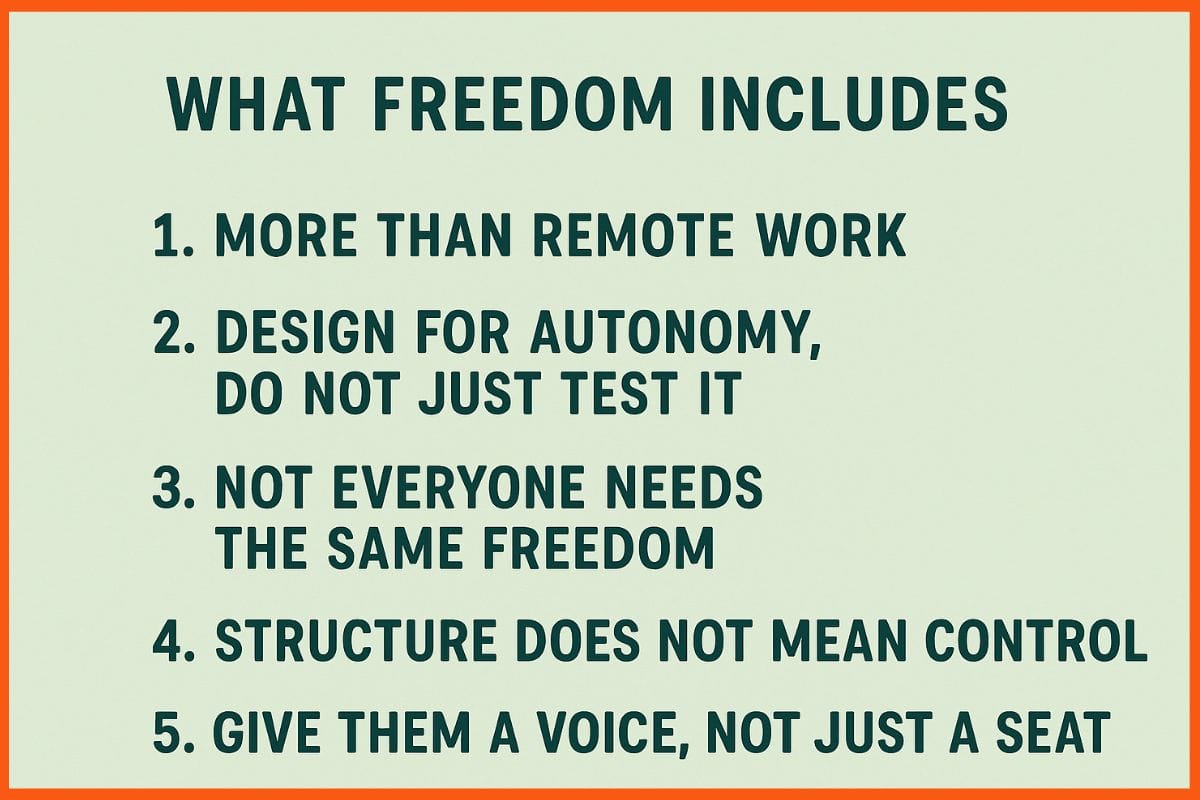This article has been contributed by Mr. Saurabh Sharma, Founder & CEO at Agile 360 Degree Consulting & Career Mentor

A software engineer who works for a mid-sized SaaS company in Bengaluru starts her day at 11 AM. She works in short bursts, skips meetings that aren't necessary, and doesn't feel like she has to stay "green" on Microsoft Teams. Her boss doesn't care how many hours she's online; he cares about the quality of her code. She feels trusted and acts accordingly.
Meanwhile, at a fintech startup, the setup is stricter. Engineers log in by 9. Webcams stay on. Software monitors activity. Even small tasks need daily updates. Productivity looks fine on paper, but motivation is running low. There’s little space for creative thinking. Both teams write code. But only ONE really feels FREE. This is not just about location or hours. Professionals today, especially Gen Z and millennials, don't want to be micromanaged; they want to be free to do their own thing. They don't want to be watched; they want to be able to change. They want to be trusted, not just told what to do.
What Freedom Includes

Working from anywhere is only one aspect of freedom. It's about not being micromanaged and having the freedom to think, make decisions, and deliver. However, trust and intention are necessary for it to succeed.
More Than Remote Work
Modern professionals are not only asking for remote options or compressed workweeks. They want the ability to choose how they work, not just when or where. This shift is not rooted in rebellion. It reflects how people work best when given clarity, space, and purpose. Many companies confuse benefits with freedom. Ping-pong tables, weekly pizza parties, and WFH policies do not count when employees are being tracked down to the minute. Surveillance software like Time Doctor or Hubstaff might offer visibility, but they fail to build accountability. Instead, they create a culture of suspicion. One developer admitted to spending hours subtly moving her mouse during breaks just to appear active. That is not productivity. That is performative compliance.
Design for Autonomy, Do not Just Test It
Some companies treat freedom as a reward for tenure or trust earned over time. That approach is outdated. Progressive organisations are designing autonomy into their work cultures. A SaaS firm in Hyderabad introduced four-day workweeks for high-performing teams, not as a perk, but as a built-in incentive for ownership. A creative agency in Mumbai let designers choose which clients to work with. These frameworks promote accountability, not chaos. Freedom works best when it is part of the operating system, not a toggle switch.
Not Everyone Needs the Same Freedom
Freedom in the workplace is not universal. Different roles and individuals call for varying degrees of independence. Long periods of unbroken time might be preferred by a backend engineer. A salesperson may benefit greatly from ongoing feedback. A fresher could need more guidance. A working parent might value fewer late-evening meetings more than a bonus. The best teams do not issue blanket policies. They adapt flexibility based on function, responsibility, and individual need. This kind of modular autonomy helps everyone operate at their best, without forcing uniformity.
Structure Does Not Mean Control
Micromanagement has taken new forms. From frequent Slack pings to screen time trackers, many managers default to control when things feel uncertain. But especially in knowledge-based workcreative, engineering, or research—output rarely correlates with time spent at a desk. Some companies are shifting away from this model. A product firm in Hyderabad adopted an OKR (Objectives and Key Results) framework. Instead of focusing on activity logs, they tracked outcomes and encouraged peer reviews. Updates became asynchronous, not forced into daily syncs. As a result, teams felt more empowered, and they got more done. Structure should be like a railway track, guiding direction, not blocking movement.
Give Them a Voice, Not Just a Seat
Freedom is not just about work style. It is also about being heard. Companies that build listening systems, anonymous culture surveys, ombudsman channels, and skip-level check-ins often detect friction early. One AI startup in Bengaluru introduced an anonymous reporting system and saw better team alignment and lower attrition in six months. This is about giving people safe spaces to speak up, share ideas, and express concerns. Psychological safety is a form of freedom, too.
 StartupTalkySanvi Barjatya
StartupTalkySanvi Barjatya
Freedom Comes with Responsibility
Freedom only works when there is something to anchor it. Without clear goals, support, and ownership, even the best intentions can fall apart.
When Freedom Backfires
A product startup in Pune once gave its team total flexibility, no fixed hours, and no required meetings. It sounded perfect. But soon, deadlines slipped, meetings lost rhythm, and collaboration dropped. Productivity did not suffer due to freedom; it suffered due to a lack of clarity. They adjusted the course by introducing weekly check-ins, setting visible project timelines, and clarifying ownership. Momentum returned. Autonomy does not mean no rules. It means the right rules, paired with mutual understanding.
Freedom Requires Coaching
When the pandemic made working from home the norm, people suddenly got a lot more freedom. But not everyone knew how to handle it. Timelines got fuzzy without coaching or clear roles. People lost focus in meetings. Less responsibility. Workers had a hard time because they didn't know how to use their freedom well, not because they didn't want it. A startup in Gurugram dealt with this by giving teams that were moving to outcome-based roles transition coaches. The effect was immediate: fewer delays, clearer goals, and more ownership.
You can't just give people freedom; you have to teach them how to use it. People need help to manage themselves in ways that matter. Tools should Enable, Not Police. There is a thin line between tools that help you get things done and tools that get in the way. When used for the right reasons, project management platforms, asynchronous communication tools, and dashboards can all be very helpful. But as soon as these become surveillance systems, they lose their purpose. Structure should make independence feel normal, not scary.
Conclusion
True workplace freedom is about trust, not absence. Employees want to be seen, heard, and respected, not just managed. When freedom is structured well, it does not just benefit employees. It unlocks deeper ownership, better outcomes, and stronger team cohesion. Workplace freedom is not just about flexibility or location. It is about trust, clarity, and ownership.
Employees today are not asking to be left alone. They are asking to be trusted. They want to contribute on their terms, but towards shared goals. They do not want to be clocked; they want to be counted. It is not flexibility that drives performance. It is ownership. And organisations that understand this will not only attract better talent, they will build stronger, more resilient teams.
 StartupTalkyAnik Banerjee
StartupTalkyAnik Banerjee
Original Article
(Disclaimer – This post is auto-fetched from publicly available RSS feeds. Original source: Startuptalky. All rights belong to the respective publisher.)